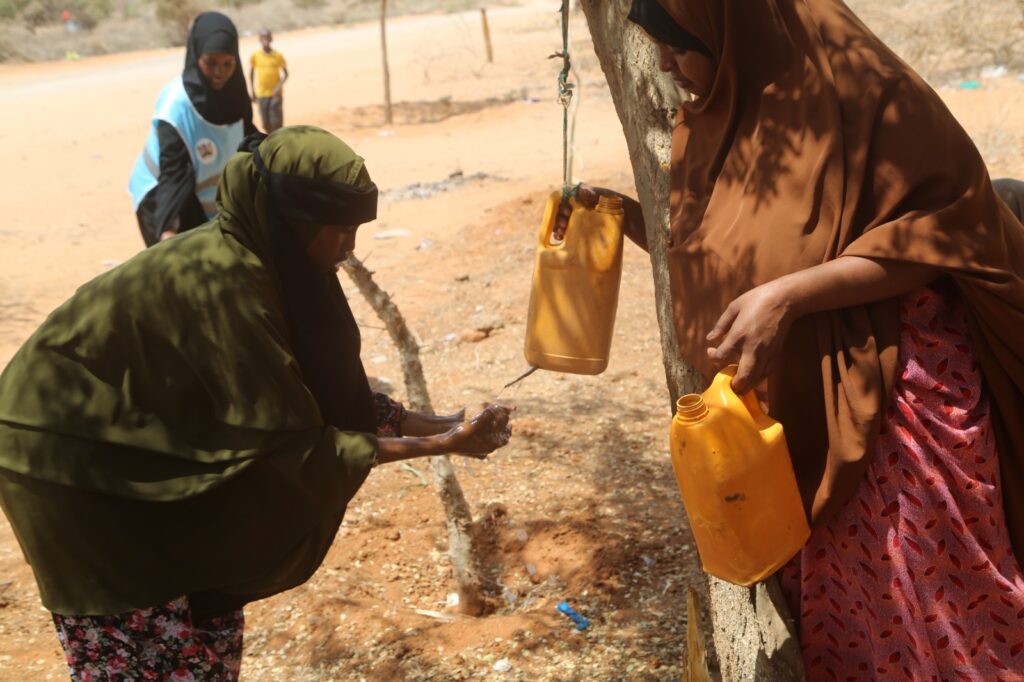Introduction
In Kenya, access to clean water and adequate sanitation remains a major challenge, particularly for vulnerable communities. In Mandera County, Kenya, poor waste management, lack of access to clean water, and inadequate hygiene practices especially during flood seasons have led to frequent outbreaks of acute watery diseases, including cholera and diarrhoea, disproportionately affecting children and other vulnerable groups. Globally, diarrhoeal diseases are the second leading cause of death among children under five. According to the World Health Organization (WHO), 842,000 deaths from diarrhoeal diseases could be prevented annually through improved hygiene and sanitation practices.

Hygiene Promotion Campaigns
Traditional hygiene promotion efforts often focus solely on raising awareness, but research shows that knowledge alone does not necessarily translate into sustained behavioural change. Recognizing this, Nomadic Assistance for Peace and Development (NAPAD), with support from Oxfam, implemented a water, saniataion and hygiene, campaign with aspects of social behaviour change communication aimed at positive behavioural change among the target communities towards improved hygiene and sanitation.
One of the components of the initiative involved conducting community-driven hygiene promotion dialogue sessions and door to door awareness campaigns in Darika,Bur Abor, Fiqo, and Bulla Haji villages in Mandera East subcounty. Trained Community Health Promoters (CHPs) led these sessions, disseminating key hygiene and sanitation messages. One critical issue identified during the assessments was the low rate of handwashing, particularly at key moments such as before meals and after using the latrine.
According to WHO, proper handwashing with soap can reduce the incidence of acute watery diseases by nearly 50% and respiratory infections by about 25%. However, globally, only one in five people practice regular handwashing. Addressing this gap, the campaign placed a strong emphasis on handwashing promotion, demonstrating proper techniques and encouraging the adoption of handwashing stations in homes and communal areas and the use of tippy taps which could be made easily using locally available materials.

Hands-On Community Engagement through Hygiene Promotion Action Day
As part of this initiative, a hygiene promotion action day was organized in Darika village to reinforce key hygiene behaviours through practical activities. The event involved direct participation from community members, emphasizing the importance of collective responsibility in maintaining hygiene and sanitation in their community. During the action day, the CHPs worked alongside the community members to remove accumulated solid waste and stagnant water to eliminate insect breeding sites, clean and disinfect communal latrines to reduce disease transmission, and installed handwashing stations using locally available materials.
By engaging community members in hands-on sanitation efforts, the initiative is not only mitigating the spread of acute watery diseases but also promoting a sense of ownership and accountability for improved health within the community. To supplement these, 800 households also received WASH non-food items, items including buckets, 20L jerricans, treated mosquito nets, toiletries, and dignity kits.
Impact
The initiative has led to a noticeable shift in hygiene practices across the targeted villages, with the CHPs reaching approximately 1,722 households. Through structured community dialogues, they have demystified misconceptions, promoted affordable hygiene solutions, and encouraged sustainable hygiene behaviour change practices.

Mama Adey, shared how the campaign transformed her household’s hygiene habits, sharing that “she now ensures she uses clean water for her domestic needs and her children wash their hands regularly.”
Integrating education with hands-on participation ensures that improved hygiene behaviours are not only adopted but also sustained beyond the intervention period. With continued community engagement and support, NAPAD and its partners are committed to strengthening hygiene practices, reducing disease outbreaks, and improving overall water, sanitation, and hygiene needs in Mandera County.
